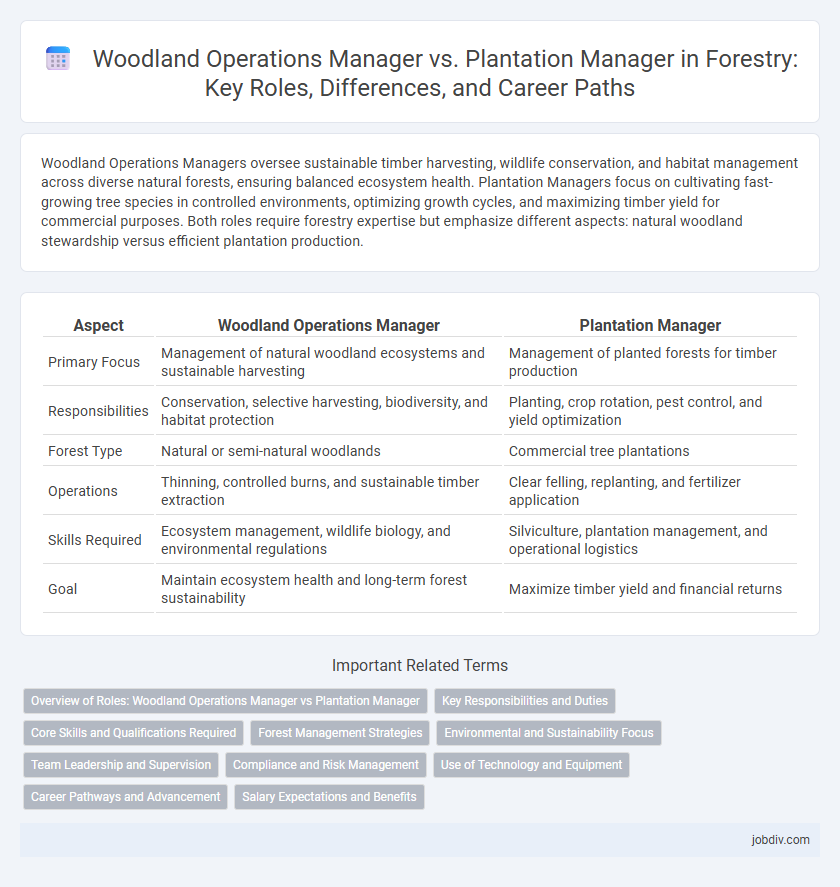Woodland Operations Managers oversee sustainable timber harvesting, wildlife conservation, and habitat management across diverse natural forests, ensuring balanced ecosystem health. Plantation Managers focus on cultivating fast-growing tree species in controlled environments, optimizing growth cycles, and maximizing timber yield for commercial purposes. Both roles require forestry expertise but emphasize different aspects: natural woodland stewardship versus efficient plantation production.
Table of Comparison
| Aspect | Woodland Operations Manager | Plantation Manager |
|---|---|---|
| Primary Focus | Management of natural woodland ecosystems and sustainable harvesting | Management of planted forests for timber production |
| Responsibilities | Conservation, selective harvesting, biodiversity, and habitat protection | Planting, crop rotation, pest control, and yield optimization |
| Forest Type | Natural or semi-natural woodlands | Commercial tree plantations |
| Operations | Thinning, controlled burns, and sustainable timber extraction | Clear felling, replanting, and fertilizer application |
| Skills Required | Ecosystem management, wildlife biology, and environmental regulations | Silviculture, plantation management, and operational logistics |
| Goal | Maintain ecosystem health and long-term forest sustainability | Maximize timber yield and financial returns |
Overview of Roles: Woodland Operations Manager vs Plantation Manager
Woodland Operations Managers oversee sustainable forest management, including timber harvesting, conservation practices, and regulatory compliance across natural woodlands. Plantation Managers focus on managing tree plantations by planning planting cycles, pest control, and optimizing growth for commercial production. Both roles require coordination of resources and personnel but differ in ecosystem type and operational objectives.
Key Responsibilities and Duties
Woodland Operations Managers oversee the sustainable management, harvesting, and conservation of natural forests, ensuring compliance with environmental regulations and optimizing timber production while maintaining biodiversity. Plantation Managers focus on the establishment, cultivation, and maintenance of commercial tree plantations, managing planting schedules, pest control, and yield maximization for species like eucalyptus and pine. Both roles require expertise in forestry planning, resource allocation, and staff supervision but differ in ecosystem management and operational scale.
Core Skills and Qualifications Required
Woodland Operations Managers require expertise in sustainable forest management, timber harvesting techniques, and environmental compliance, often necessitating a degree in forestry or natural resource management with strong leadership skills. Plantation Managers focus on crop production optimization, pest control, and plantation establishment, requiring knowledge in silviculture, agronomy, and proficient use of plantation management software. Both roles demand proficiency in health and safety regulations, budget management, and effective communication within forestry operations.
Forest Management Strategies
Woodland Operations Managers and Plantation Managers implement distinct forest management strategies tailored to their environments; Woodland Operations Managers prioritize sustainable harvesting, biodiversity conservation, and ecosystem resilience in natural forests, while Plantation Managers focus on maximizing yield through monoculture planting, pest control, and efficient rotation cycles. Effective forest management in woodland operations involves selective logging, natural regeneration, and habitat protection, contrasting with the controlled environment strategies used in plantations emphasizing growth optimization and disease management. Both roles require comprehensive planning and resource allocation to balance economic goals with environmental stewardship in forestry operations.
Environmental and Sustainability Focus
A Woodland Operations Manager emphasizes sustainable forest management by overseeing diverse ecosystems, promoting biodiversity, and implementing conservation practices that minimize ecological impact. In contrast, a Plantation Manager focuses on optimizing the growth and yield of commercially planted tree species, often balancing productivity with sustainable practices like soil health maintenance and pest management. Both roles integrate environmental stewardship but differ in scope, with Woodland Operations targeting natural forest preservation and Plantation Management oriented toward sustainable resource production.
Team Leadership and Supervision
A Woodland Operations Manager oversees diverse forest environments, coordinating multidisciplinary teams to execute sustainable harvesting, reforestation, and conservation tasks, ensuring compliance with environmental regulations. A Plantation Manager specializes in monoculture crop management, directing labor and machinery to maximize growth and yield through efficient planting, maintenance, and pest control schedules. Both roles demand strong leadership and supervision skills, but the former emphasizes adaptability across natural forest ecosystems while the latter focuses on optimized operational efficiency in controlled plantation settings.
Compliance and Risk Management
Woodland Operations Managers oversee sustainable harvesting practices and ensure compliance with forestry regulations such as the Forest Stewardship Council (FSC) standards, focusing on minimizing environmental impact and operational risks. Plantation Managers prioritize regulatory adherence related to crop health, pest management, and reforestation efforts, managing risks associated with monoculture plantations and disease outbreaks. Both roles implement risk management strategies, but Woodland Operations Managers have a broader scope in ecological compliance, while Plantation Managers concentrate on agricultural and plantation-specific regulations.
Use of Technology and Equipment
Woodland Operations Managers leverage GIS mapping, drone surveillance, and automated harvesters to optimize sustainable forest management across natural woodlands. Plantation Managers focus on precision agriculture technologies such as soil sensors, automated irrigation systems, and mechanized planters to enhance tree growth and yield in monoculture plantations. The integration of real-time data analytics and remote sensing technologies is pivotal for both roles to improve operational efficiency and environmental impact.
Career Pathways and Advancement
Woodland Operations Managers oversee natural forest management, specializing in sustainable timber harvesting, ecosystem maintenance, and regulatory compliance, often advancing toward regional forestry director roles. Plantation Managers focus on cultivated tree crops, optimizing growth cycles, pest control, and resource allocation, with career growth leading to senior plantation supervisor or agribusiness management positions. Both pathways demand expertise in silviculture and project management but diverge in operational scale and ecological focus, influencing specialized advancement opportunities.
Salary Expectations and Benefits
Woodland Operations Managers typically earn between $65,000 and $85,000 annually, reflecting their responsibility for overseeing diverse forest management activities, including timber harvesting and environmental compliance. Plantation Managers often command higher salaries ranging from $75,000 to $100,000 due to their specialized role in managing monoculture plantations, optimizing crop yields, and coordinating planting schedules. Benefits for both positions commonly include health insurance, retirement plans, performance bonuses, and opportunities for professional development, with Plantation Managers sometimes receiving additional incentives linked to productivity and sustainability targets.
Woodland Operations Manager vs Plantation Manager Infographic

 jobdiv.com
jobdiv.com